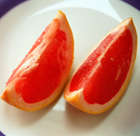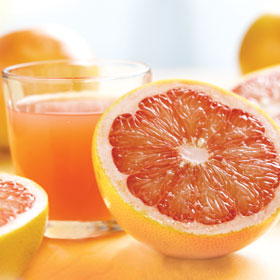그럴수 있다
하지만 연구가 아직 초보적 단계이니 아직 단정지을 순 없으며 섭취량에 대한 연구가 더 필요하다.
1993년~2002년까지 5개 인종 46,080명의 폐경이후 여성/유방암 비경험 여성들을 대상으로 한 연구에서
이들은 평균 하루에 자몽 1/4개 혹은 이틀에 반개 정도 먹는데 이는 자몽을 먹지 않는 여성에 비해
30% 정도 유방암 발병률이 높았다.
자몽은 체내 여러 약물들, 특히 에스트로겐과 반응하며 체내 약물 농도를 높혀주므로 필히
홀몬제와 자몽은 같이 복용하지 말아야 한다
앞으로 더 연구해서 적정 섭치량 설정, 폐경기 이전 여성의 섭취, 유방암환자의 섭취량 설정 등 선결해야 할
여러가지 과제가 많다
덧붙혀, 과일 및 야채를 섭취할때는 한가지만 집중적으로 섭취하지 말고 여러가지 색깔의 것을 골고루
섭취하는 것이 좋다
끝으로, 자몽 쥬스 한잔이 에스트로겐 농도에 영향을 미치는 시간은 대략 72시간 정도다.

원문:
| Grapefruit Linked to Breast Cancer? | |
| More Study Needed, Experts Say | |
| Article date: 2007/08/16 | |
|
Could eating grapefruit daily raise a woman's risk of breast cancer? Possibly, researchers from the University of Southern California report in the British Journal of Cancer. But they stress that the finding is preliminary and must be investigated further before any recommendations can be made about how much grapefruit women should eat. "It's an interesting hypothesis, there's biological plausibility, and we want other researchers to look at it," says lead study author Kristine R. Monroe, PhD, a research associate in the Department of Preventive Medicine at the university's Keck School of Medicine. Monroe's findings come from data on 46,080 women taking part in a large lifestyle study of people from 5 ethnic/racial groups (African American, Japanese American, Hispanic/Latina, Native Hawaiian, and Caucasian) in Los Angeles and Hawaii. The women were all past menopause and none had ever had breast cancer. They filled out questionnaires about their eating habits that included information on how much grapefruit or pomelo they ate. They were followed from the study's beginning in 1993 to 2002. The women who ate the most -- about one-quarter grapefruit per day or half a grapefruit every other day -- had a 30% higher risk of breast cancer than women who ate no grapefruit. The risk remained high even after the researchers controlled for other factors that could influence breast cancer, like weight, whether the women used hormone therapy after menopause, and family history of the disease. Researchers say grapefruit's unique effects on metabolism may be behind the increased risk seen in this study. The fruit is known to interact with many drugs, causing more of the medication to circulate in the blood. In effect, many drugs become more potent if taken with grapefruit, and many carry warning labels about this potential effect. Estrogen -- the hormone that fuels most breast cancers -- is one of the substances that interacts with grapefruit. At least two previous studies have found higher estrogen levels in women consuming grapefruit or grapefruit juice, and the US Food and Drug Administration requires hormone replacement products to carry warning labels stating that grapefruit juice may increase the concentration of estrogen in the body. Many Unanswered Questions
So should you stop eating grapefruit? There's not yet enough evidence to make that recommendation, Monroe says. "This needs to be confirmed in other studies," she says. "I would use caution until further studies are done and a scientific conclusion can be reached." Although the study had provocative findings, it was just one study, and there are many questions it could not answer. For instance, the study did not examine grapefruit juice as a separate food item. Could drinking the juice, but not eating the fruit, also raise risk? What about consuming both? It is impossible to know at this point. Also still in question: What kind of effect might grapefruit consumption have on women who have not yet reached menopause, or on those who have already had breast cancer? Because the study did not include women in either of these categories, that cannot be determined. American Cancer Society epidemiologist Michael Thun, MD, agrees it's too soon to issue recommendations about grapefruit consumption. But he says women who are worried about these findings can cut back. "Results from a single epidemiological study are insufficient as a basis for recommendations," says Thun, who is vice president of epidemiology and surveillance research at ACS. "In this case, however, other studies have established that even modest consumption of grapefruit affects the action of many drugs. Women who have had estrogen-receptor positive breast cancer or are concerned for other reasons could consider substituting other fruit until this issue is clarified." Variety Important
Until more is known, women would be well advised to follow ACS nutrition guidelines for cancer prevention, says Marji McCullough, ScD, RD, ACS strategic director of nutritional epidemiology. The guidelines emphasize eating at least 5 daily servings of a wide variety of fruits and vegetables of different colors. A varied diet not only maximizes intake of beneficial plant nutrients, but could also limit the amount of potentially harmful substances from any single food. Further, eating fruits and vegetables helps to prevent excess weight gain in adulthood, a factor known to increase the risk of breast cancer. Monroe says future studies of grapefruit should not only seek to confirm her team's findings, but also to quantify grapefruit's effects by measuring estrogen levels before the fruit is eaten and afterward. Studies should also explore how long grapefruit's effect on estrogen lasts in the body, she says, as previous research has shown elevated levels of some drugs as much as 72 hours after drinking a single glass of grapefruit juice. Citation: "Prospective Study of Grapefruit Intake and Risk of Breast Cancer In Postmenopausal Women: The Multiethnic Cohort Study." Published in the July 31, 2007, British Journal of Cancer (Vol. 97, No. 3:440-445). First author: K.R. Monroe, PhD, Keck School of Medicine, University of Southern California. ACS News Center stories are provided as a source of cancer-related news and are not intended to be used as press releases. |
'▶ Pharmacy' 카테고리의 다른 글
| 당뇨병, 진단 / 치료 기준 확 바꼈다 (0) | 2008.08.12 |
|---|---|
| 잘못 알려진 당뇨상식 베스트 10 (1) | 2008.08.11 |
| 주의력결핍 과다행동장애 (ADHD) (0) | 2008.08.11 |
| 운동 중 너무 많은 양의 수분섭취로 죽을 수 있다. (0) | 2008.08.11 |
| 신체 부위별 좋은 음식 (0) | 2008.08.11 |
| 같이 근무하실 약사님을 모십니다^^ (0) | 2008.08.09 |
| 안녕하세요? "굿모닝 약국" 입니다 ^^ (0) | 2008.08.05 |
| 12가지 건강 쥬스 (0) | 2007.11.23 |







댓글